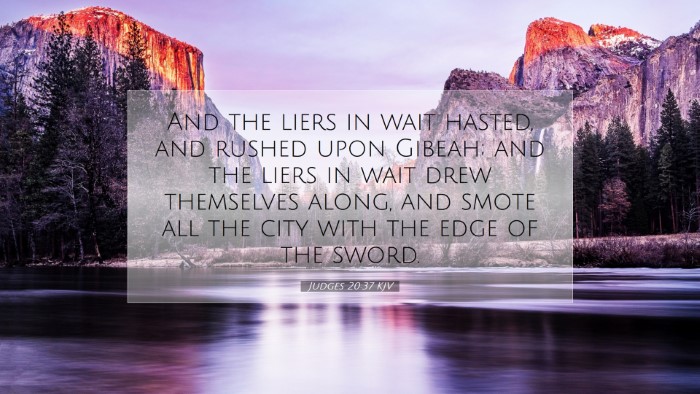Bible Commentary on Judges 20:37
Verse Context: Judges 20:37 states, "And the second time they set liers in wait in the rear of Gibeah." This verse is situated within the narrative of the conflict between the tribe of Benjamin and the other tribes of Israel after the grievous incident in Gibeah.
Overview and Analysis
This passage exemplifies strategic military tactics employed by Israel against their brethren of Benjamin during a time of internal strife. The context of civil war among the Israelites emphasizes the gravity of the situation. The divine Providence is also evident as God works through human actions to reach His predetermined outcomes.
Historical Background
The events leading to the civil war begin with a tragic event involving a Levite and his concubine, leading to a collective outrage against the inhabitants of Gibeah. The ensuing conflict illustrates the moral decay and failure of the nation to uphold justice. The tribes of Israel unite with righteous indignation, yet they must confront their own failings.
Military Strategy
The strategic tactics employed reveal much about warfare in the ancient Near East. The use of ambushes demonstrates a level of cunning and premeditated action:
- Preparation for Battle: Israel’s leaders formulate a second plan, indicating the necessity of learning from prior encounters.
- Element of Surprise: By setting "liers in wait," the Israelites aim to catch the Benjamites off guard, reinforcing military principles of surprise and deception.
Theological Implications
This conflict and strategy should push readers to reflect on the deeper implications of sin, justice, and communal integrity:
- The Nature of Conflict: Civil strife among believers showcases the seriousness of sin and the need for repentance.
- God's Sovereignty: Despite human failure, God's purpose prevails; His plans unfold even in the tumult of rebellion.
Matthew Henry's Commentary Insights
Henry addresses the surrounding circumstances leading to this ambush, highlighting the moral decline evident in the people's actions. He notes:
- Judgment: The plan to ambush Gibeah signifies God's judgment against their wickedness.
- Divine Providence: Israel turns to prayer and seeks guidance, illustrating a reliance on God amidst their discord.
Albert Barnes' Commentary Insights
Barnes elaborates on the nature of Israel's military actions. He emphasizes:
- Prior Lessons: The failure of the previous engagement prompted a change in tactics, showing wisdom in leadership.
- Justice: A focus on eliminating the sin found in Gibeah reflects a commitment to justice among God's people.
Adam Clarke's Commentary Insights
Clarke offers a detailed analysis of the ambiguity and critical nature of the conflict. He remarks:
- Sin’s Consequence: He reflects on how the sin of a few can lead to widespread consequences for many.
- Spiritual Warfare: Clarke draws parallels between physical battles and the spiritual battles faced by believers today.
Conclusion
Judges 20:37 serves as a reminder of the consequences of intra-community conflict and the pitfalls of sin among God’s people. The action taken by Israel reveals the complexities of human justice intertwined with divine justice. Through the insights of prominent commentators, we see the necessity for believers to pursue righteousness, unity, and reliance on God even in times of strife. As church leaders and theologians reflect on this passage, it compels an examination of collective sin and the need for genuine repentance and reconciliation within the Body of Christ.


